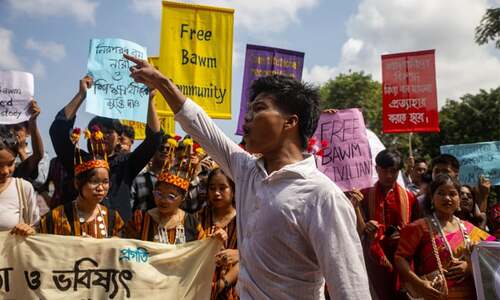THE HAGUE: Myanmar’s former pro-democracy icon Aung San Suu Kyi on Wednesday denied that her country’s armed forces committed genocide against the Rohingya minority, telling the UN’s top court that the exodus of hundreds of thousands of Muslims was the unfortunate result of a battle with insurgents.
In a measured tone, Suu Kyi calmly refuted allegations that the army had killed civilians, raped women and torched houses in 2017 in what Myanmar’s accusers describe as a deliberate campaign of ethnic cleansing and genocide that saw more than 700,00 Rohingya flee to neighbouring Bangladesh.
She said the allegations stem from an internal armed conflict started by coordinated and comprehensive armed attacks ... to which Myanmar’s defence services responded. Tragically, this armed conflict led to the exodus of several hundred thousand Muslims.
Her appearance at the International Court of Justice was striking in that Suu Kyi was defending the very armed forces that had kept her under house arrest for about 15 years.
She was awarded the 1991 Nobel Peace Prize in absentia for championing democracy and rights under Myanmar’s then-ruling junta.
Suu Kyi told the court that the African nation of Gambia, which brought the legal action against Myanmar on behalf of the 57-country Organisation of Islamic Cooperation, had provided an incomplete and misleading factual picture of what happened in Myanmar’s northern Rakhine state in August 2017.
Gambia alleges that genocide was committed and is still ongoing. It has asked the world court to take action to stop the violence, including all measures within its power to prevent all acts that amount to or contribute to the crime of genocide in Myanmar.
But Suu Kyi said developments in one of Myanmar’s poorest regions are complex and not easy to fathom. She detailed how the army responded on Aug 25, 2017, to attacks by insurgents trained by Afghan and Pakistan extremists.
Addressing the court in her capacity as Myanmar’s foreign minister, Suu Kyi insisted that the country’s armed forces had tried to reduce collateral damage during fighting in 12 locations.
While conceding that excessive force might have been used and that one helicopter may have killed non-combatants, Suu Kyi said a Myanmar investigation is looking into what happened and should be allowed to finish its work.
Can there be genocidal intent on the part of a state that actively investigates, prosecutes and punishes soldiers and officers who are accused of wrongdoing? she asked the court.
Suu Kyi and Myanmar’s legal team argued that the genocide convention does not apply to Myanmar. They invoked Croatia during the Balkans wars in the 1990s, saying that no genocide was deemed there when thousands of people were forced from their homes by fighting.
Published in Dawn, December 12th, 2019



































